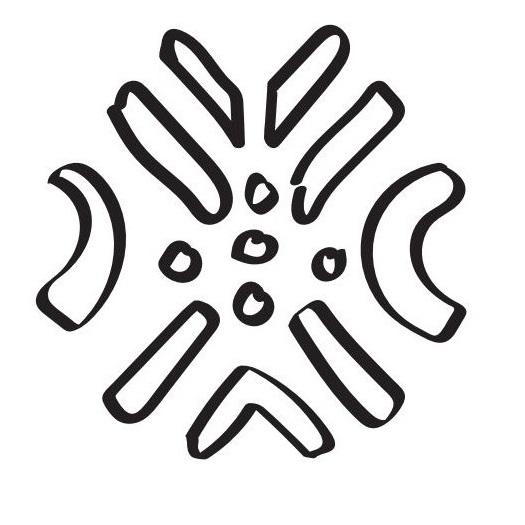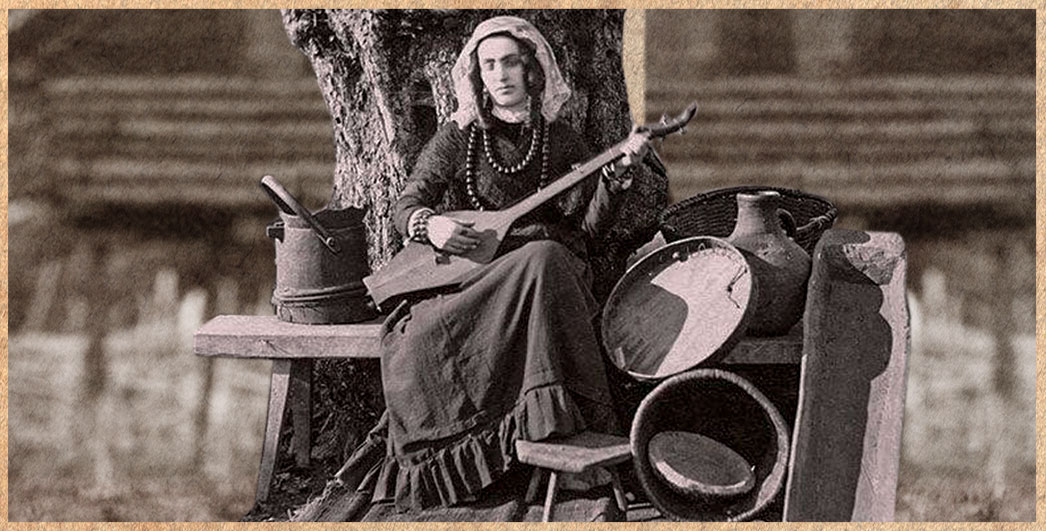The Dual Nature of Amirani
When it comes to the epic as a genre, the main narrative thread is usually presented as a story of heroic adventure, with special emphasis on the protagonist’s possession of incredible power. While the epic of Amirani does not diverge from this general format, it is worth noting that the ambivalent nature of the hero is revealed throughout the different regional versions of the text. On the one hand, he is a hero fighting against an evil force; on the other, his actions seem to be dictated by the desire to demonstrate power and glorify himself. In a previous issue of this journal I introduced the main elements of Amirani's adventures; the present article is dedicated to the question of the hero’s duality and how this duality is manifested in different versions of the epic.
Amirani Fighting the Forces of Evil
Among the chief moments in an epic hero’s adventure are battles against evil forces. In most versions of the epic, Amirani fights two antagonists: an ogre-like demon known as a devi [a kind of ogre-like demon] and a dragon. He defeats them both and becomes the savior of humanity. This positive portrayal was emphasized by the historian Ivane Javakhishvili, when he wrote: “As someone who possesses enormous strength, Amirani is constantly fighting evil creatures. He is their relentless enemy, their destroyer, because the devis are man-eaters and oppressors. In that respect, Amirani is a good hero, a fighter against the forces of evil.’[1]
Amirani's goodness is also evident in many versions of the epic. For example, according to a variant from Kartli, Amirani's uncles Badri and Sulkalmakh, who had been captured by the devi, are released thanks to Amirani’s triumph in battle. Amirani, in this telling, “took out his short sword and killed all the devis at once. The uncles, overjoyed, hugged their nephew and savior.”[2]

According to a version of the story from Svaneti, there was a nine-headed devi who did great harm to Amirani’s foster-father, Iamani. The devi demanded that he either give up his own child or his eye. Iamani chose to give up his eye over sacrificing his child. In this case, too, Amirani’s engagement with the monstrous devi is motivated by good will. The hero fearlessly fights against the agent of evil and returns the eye to his father.[3]
In yet another version from Kartli, Amirani fights three dragons, which are depicted as sea monsters and demand human sacrifice as tribute. By slaying the dragons, Amirani relieves the people from a great burden and restores peace.[4]

Fighting Evil
The positive traits of Amirani’s personality are also displayed in one of the variants from Kakheti. According to this text, he fights the wicked. This version is especially peculiar because in this case, the wrongdoers punish Amirani by chaining him, while God appears as a helper and provides food to the hero facing this ordeal.[5]In another version from Kakheti, Amirani identifies himself as “the benefactor of the poor and the suffering.”[6] According to this version, while Amirani does fight God, he does so not because of his own arrogance, but because “the world is in need of goodness.”
The Character of Amirani in Literature
In addition to the narratives of Amirani defeating the devi and the dragon, he is also positively depicted as a once-invincible hero who is deprived of his freedom. In this way, he has sometimes been employed as a symbol of Georgia in literature. He is presented in this form in Akaki Tsereteli’s poem “Tornike Eristavi.” In the poem, the yearning for Georgia's freedom is also expressed through the hope of Amirani's release. Likewise, the chained Amirani in Vazha-Pshavela’s poem “Amirani” represents a similar perspective. The author sympathizes with the demon-fighting hero and waits for the time when he will regain his usual powers.
The story of the chained Amirani is brought to life in Demna Shengelaia’s 1926 novel Sanavardo and in Galaktion Tabidze’s poem “Amirani in Chains” (“Amirani mijach’vuli”).[7] In the poem’s words, “the people cut him off—he who so loved humanity.”[8] Another poem by Galaktion Tabidze, “Native Ephemera,” (“Mshobliuri epemera”) depicts the tragic fate of the hero and the sadness of his eternal punishment.

Amirani Bound
In Georgian literature, Amirani is depicted not as a hero fighting against God, but as a character who has suffered a difficult fate. At the same time, the wide transmission of the story of the chained hero in literature speaks to the popularity of the Amirani myth itself and the public’s special appreciation of it.
Amirani Fighting for Glory
Amirani’s defeat of devis and dragons brought great good and peace to the people, which made Amirani a beloved hero. In different versions of the epic, however, it is sometime hinted that Amirani’s primary motivation was his desire for glory and the chance to demonstrate his incredible strength.
Most versions recorded in different parts of Georgia clearly mention that Amirani demonstrates signs of arrogance to the point of wanting to fight God. In these accounts, he is not concerned with danger and considers his own strength superior to any obstacle. In one variant from Kartli, for example, Amirani and his uncles encounter a devi on their way. Amirani, powerful as he is, does not kill the devi, simply because he does not view the devi as a real danger and isconfident in his own superior strength.[9] If Amirani’s main motivation for fighting had been the welfare of the people, and not self-aggrandizement, then he would have killed the devi without a second thought, since the evil devi presented a great threat to society. This is further evident in the episode when Amirani is unable to move the dead Ambri-the-Arab’s leg: “He sat down in darkness. Day and night became one for him. He knew neither people nor spirits.”[10] If Amirani’s objective was simply to overcome evil—not to fight for victory and glory—why should the defeat bring him so much suffering? Being beat by Ambri-the-Arab showed Amirani that he was not invincible, and this was the reason for his sadness. Amirani returned to the light of day only when the Lord replenished his strength, and immediately he tried to prove his abilities in a rather crude way: “He would pick up and hurl everything he came across every which way.”[11]
For Amirani, the existence of someone stronger than him is an insult to his own power. The desire for glory gradually increases, and the hero also tries to beat everyone who is better, or may become better than him in the future. According to a variant from Pshavi, when Amirani was unable to even lift the dead man's leg off the ground, Ambri-the-Arab’s mother, who is nearby, says: “Is this the great force with which you, Amirani, son of Darejan, threaten Ambri? Did you challenge my son to a fight with so little strength?” Despite Amirani's initial inability to lift the leg, it is implied in the legend that he harbored intentions of fighting Ambri-the-Arab at some point. This suggests that Amirani's desire for glory and his determination to prove his superiority were so strong that he still sought to challenge Ambri, even though he appeared physically weaker in that moment.[12]
In yet another version of the story from Svaneti, Amirani clearly expresses his desire to be glorified and breaks oaths made in the name of the Lord three times. The third of these involved Andrerobi, a Svan version of the character Ambri. As he was dying, Andrerobi hands over his own son to Amirani and makes him swear to God to treat his son like a brother and not to betray him. The son of Andrerobi turns out to possess quite formidable strength and ability. Once, when he caught two deer, and Amirani was disturbed and decided to eliminate his rival: “He is still a boy and he is already able to do this, [Amiran said to himself]. Once he becomes a man, he will be able to defeat me. [Amirani] then made up his mind to kill him, which he subsequently did.”[13]
In another Svan text, Amirani swears brotherly loyalty to two children who grow up very quickly and display amazing strength. Amirani, as was the case with Andrerobi’s son, becomes afraid that they will be stronger than him in the future and kills them both. In fact, he was so conceited that he rid the earth of everything except three men, three women, and three oaks.[14]
A variant recorded in Kakheti, perfectly illustrates Amirani’s arrogant nature. According to this text, Amirani would challenge anyone who crossed his path to a wrestling match and brutally beat them.[15] A Svan version also tells us that “No one in the world was stronger than Amirani, because whether through betrayal or by physical defeat, he would eliminate anyone who challenged him.”[16] Thus, the hero fighting the devis became a hero fighting against God, which determined the tragic end to his story.
The epic of Amirani shows that the nature of a hero can manifest in two ways. Some of the versions emphasize Amirani's tireless struggle to establish goodness and peace, while other versions focus on his desire to glorify himself and show off his power. Despite his desire to challenge God, Amirani is imprinted in the public consciousness as a kind character, fighting against the forces of evil. This impression, it is safe to say, can largely be explained by the way he is portrayed in Georgian literature. It seems that not drawing attention to the hero’s hubris and focusing on his suffering, together with the allegorical interpretation of the hero’s plight, contributed to the general tendency of portraying Amirani as a positive character.
[1] Ivane Javakhishvili, Kartveli eris ist’oria (History of the Georgian nation), vol. I (Tbilisi: Tbilisis sakhelmts’ipo universit’et’is gamomtsemloba, 1951) 154.
[2] Kartuli khalkhuri p’roza (Georgian Folk Prose), vol. II, Amiraniani, (Tbilisi: Gamomtsemloba TSU, 2019), 121.
[3] Kartuli khalkhuri p’roza, 316.
[4] Kartuli khalkhuri p’roza, 37.
[5] Kartuli khalkhuri p’roza, 144.
[6] Kartuli khalkhuri p’roza, 99.
[7] In "Sanavardo," Demna Shengelaia presents the dangerous pandemic disease malaria with symbolic significance, portraying “chained Amiran" as “the embodiment and symbol of constrained freedom” (eds.).
[8] Galaktion Tabidze, Tkhzulebani (Works), vol. 4 (Tbilisi: Melgami, 1947), 46.
[9] Mikhail Chikovani, Mijach’vuli amirani (Amirani bound) (Tbilisi: Tbilisis sakhelmts’ipo universit’et’is gamomtsemloba, 1947), 275.
[10] Chikovani, Mijach’vuli amirani, 325.
[11] Chikovani, Mijach’vuli amirani, 277.
[12] In the variant recorded in Pshavi, Ambri-the-Arabi is described as an enemy of Amirani. Ambri’s mother, in the story, recognized Amirani and wanted to test him by challenging him to lift Ambri’s leg.
[13] Chikovani, Mijach’vuli Amirani, 274.
[14] Kartuli khalkhuri p’roza, 335.
[15] Kartuli khalkhuri p’roza, 134.
[16] Kartuli khalkhuri p’roza, 321.
The illustrations used in the article are by Vakhtang Oniani.




